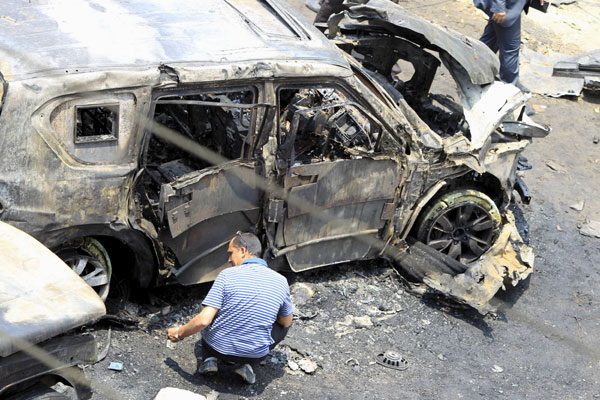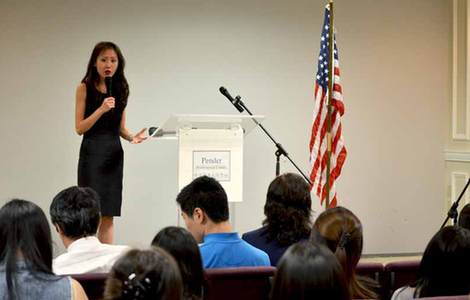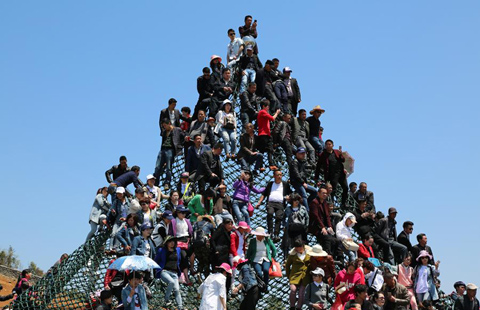Bomb kills Egypt's top prosecutor as he drives to work
Updated: 2015-06-30 10:35
(Agencies)
|
||||||||
 |
|
A crime scene investigator investigates the site of a car bomb attack on the convoy of Egyptian public prosecutor Hisham Barakat near his house at Heliopolis district in Cairo, June 29, 2015. Barakat died from wounds sustained in a bomb attack on Monday that had targeted his convoy in Cairo, state news agency MENA said. [Photo/Agencies] |
CAIRO - A car bomb killed Egypt's chief prosecutor Monday in the country's first assassination of a senior official in 25 years, marking what could be an escalation in a campaign by Islamic militants toward targeting leaders of a crackdown on the Muslim Brotherhood.
Hisham Barakat led the prosecution of members of the Brotherhood and other Islamists, including former president Mohammed Morsi, who was overthrown by the military in July 2013. The courts have been handing out mass death sentences against them in trials harshly criticized as lacking due process.
Monday's assassination of the 65-year-old Barakat came on the eve of the second anniversary of the mass demonstrations against Morsi that led to his ouster.
A car laden with explosives was detonated by remote control around 10 am as Barakat's motorcade left his home in the eastern district of Heliopolis, police said. He suffered multiple shrapnel wounds and was pronounced dead at 12:30 pm following surgery, medical officials said. Five guards, two drivers and one civilian also were injured in the blast.
An Egyptian militant group calling itself "Popular Resistance in Giza" claimed responsibility for the attack in an online statement, with photographs from the site of the bombing. The claim could not be independently verified. In a statement, the Muslim Brotherhood denied responsibility, but blamed authorities for the violence.
Authorities and pro-government TV networks blamed the Brotherhood, which they consider a terrorist group, broadly accusing it of orchestrating violence.
A senior security official said an initial investigation showed that Islamic militants along with the Brotherhood were responsible, while the State Information Service said the killing "clearly shows the terrorist group's violent discourse" and underscores its "rejection of the state of law." It equated the Brotherhood with extremist groups fighting in Iraq and Syria or killing tourists in Tunisia.
All the officials spoke on condition of anonymity because they were not authorized to talk to the media.
The Brotherhood has maintained that peaceful means are the only way to resist what it called a coup against Morsi, but recent shifts within the group's youth cadres have signaled frustration with that approach and new support for using force.
Islamic militants, who for years had turned Egypt's Sinai Peninsula into a stronghold, widened their insurgency after Morsi's overthrow.
Militants have focused on police and the military but in recent months have targeted the judiciary. On Sunday, the Islamic State released video showing the May assassination of three judges in the northern Sinai city of el-Arish, accusing them of ruling against "God's laws."
While most of Egypt's major suicide bombings were carried by an Islamic State affiliate - previously known as Ansar Beit al-Maqdis - lesser-known groups under the "Popular Resistance" moniker have claimed responsibility for smaller attacks, including those against police and sabotaging infrastructure.
The killing recalled one of Egypt's darkest chapters, when Islamic militants and the state security apparatus engaged in retaliatory killings for nearly a decade starting in 1990. That year, the militants gunned down parliament speaker Rifaat el-Mahgoub in Cairo, the last assassination of a senior official. There were attempts against other ministers until the insurgency was crushed in the late 1990s.
At the site of Monday's bombing, rubble and twisted metal was strewn across a city block. Several charred cars were in the middle of the street, and a dozen others were wrecked. Nearby buildings also were damaged, including ground-floor shops, apartment balconies and dozens of windows were shattered. Some residents sobbed as they went through the debris.
"I walked around the corner into wall of smoke and fire from the blast, glass flew everywhere and was falling," said Ali Abdullah, who lives on an adjoining street. Video showed firefighters dousing the flames, some of which had spread to trees.
At Al-Nozha Hospital, where Barakat was taken, two dozen police with assault rifles ringed the area and men in suits with submachine guns guarded the main door.
Announcing his death, the Justice Ministry described Barakat as a "martyr."
President Abdel-Fattah el-Sissi's office vowed the culprits would "face the harshest punishment." Foreign Minister Sameh Shukri called it a "hideous terrorist incident" that will only boost support for the government's war on terrorism.
TV networks replaced popular Ramadan soap operas Monday night with live feeds from outside the hospital and from his house, as well as readings from the Quran.
The bombing was condemned by UN Secretary-General Ban Ki-moon, Amnesty International and the White House.
"The United States stands by Egypt at this difficult time, as we continue to work together to fight the scourge of terrorism," US National Security Council spokesman Ned Price said.
Barakat lived near Egypt's heavily fortified military academy, and the attack came as security forces already were on high alert ahead of the anniversary the 2013 rallies by millions of people demanding Morsi's ouster. Anti-government demonstrators plan to protest any June 30 celebrations, and some extremist groups have called for attacks.
Morsi was removed from power by el-Sissi, who was then-army chief, following mass demonstrations. Protesters had called on Morsi to resign over allegations he abused power in favor of the Brotherhood. The rallies culminated on July 3, when the military stepped in and jailed Morsi.
His supporters responded with a campaign of street protests. In the ensuing crackdown, security forces killed hundreds and detained tens of thousands, while el-Sissi went on to win election as president last year, although election observers said the vote took place under unsatisfactory conditions.
Morsi has since been sentenced to death over a mass prison break during the 2011 uprising that eventually brought him to power. He also faces trial on other charges that carry the death penalty.
The last attempt to kill a high government official was a 2013 suicide bombing that failed to kill then-Interior Minister Mohammed Ibrahim. Ansar Beit al-Maqdis - which has since pledged allegiance to the Islamic State group - claimed responsibility for that attack. Now, it calls itself the Islamic State group's Sinai Province and has claimed most of Egypt's major suicide bombings and assassinations.
About the same time of Monday's attack, a bomb exploded in a village near el-Arish, killing three engineers riding in a bus, security officials said. They added that the militants who triggered the bomb apparently thought the bus was carrying soldiers.
- Japan's Diet gets 1.65m signatures against security bills
- Thailand's first MERS case declared free of deadly virus
- US, New Zealand to discuss Pacific co-op
- Beijing and Brussels unlikely to reach consensus on investment synergy
- Hollande, Essebsi vow 'solidarity against terrorism' after attacks
- French beheading suspect was 'normal neighbour'
Most Viewed
Editor's Picks

|

|

|

|

|

|
Today's Top News
European visit to find economic synergies
Disney bans selfie sticks at theme parks over safety concerns
China gets 30% stake in AIIB as bank takes shape
New York prison break ends with shooting of 2nd fugitive
Nation can meet growth challenges, premier says
China mulling 'green finance' to tackle environmental blues
Top leadership studies anticorruption ahead of CPC anniversary
Key events in the history of US gay rights
US Weekly

|

|















